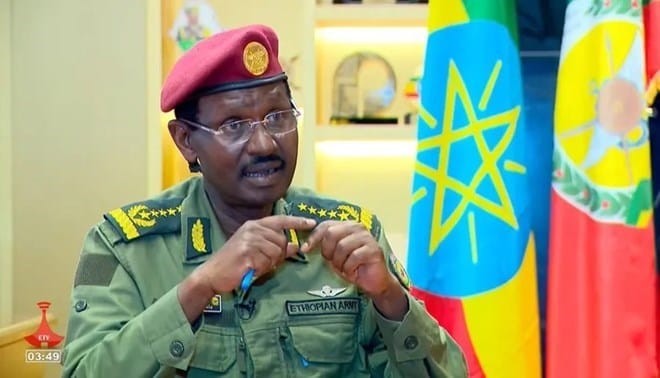Ethiopia’s top military leader has voiced deep concerns over Egypt’s expanding military footprint in Somalia, describing it as a direct threat to Ethiopia’s national security interests.
Field Marshal Berhanu Jula, Chief of the Ethiopian National Defense Forces (ENDF), told Ethiopian lawmakers on Saturday that foreign troops stationed in Somalia—under the pretense of cooperation—could undermine regional stability and Ethiopia’s sovereignty.
“Foreign military actors are now present in Somalia with unclear motives,” he said in a parliamentary briefing. “Their strategic objectives must be carefully scrutinized in the context of Ethiopia’s national security.”
While Berhanu refrained from naming Egypt directly, his comments come in the wake of a military cooperation deal signed between Cairo and Mogadishu in August 2024. That agreement reportedly includes the deployment of up to 10,000 Egyptian troops, with a portion embedded within the African Union’s AUSSOM stabilization mission, while others operate under direct bilateral command. Weapon transfers are also part of the arrangement.
Ethiopia, which itself maintains troops in Somalia under both AU and bilateral frameworks, fears that Egypt’s growing influence in the region may be part of a larger strategy to contain Addis Ababa—particularly in light of long-standing tensions over the Grand Ethiopian Renaissance Dam (GERD) on the Nile River.
For over a decade, Ethiopia and Egypt have been at odds over the dam, with Cairo concerned about its impact on downstream water flow. Ethiopia, in contrast, insists that GERD is a sovereign project essential for its development and energy needs.
“The security context is evolving,” Berhanu told MPs. “What was once a stabilization mission now requires recalibration. Our presence must reflect Ethiopia’s changing strategic priorities.”
Though exact numbers were not disclosed, the Field Marshal confirmed that military planners are reassessing Ethiopia’s deployment posture in light of what he termed “emerging regional challenges.”
The Somali government has defended its defense pact with Egypt, stating that it supports the rebuilding of Somalia’s armed forces and was endorsed by the African Union. Officials in Mogadishu maintain that the agreement poses no threat to neighboring states.
However, the Cairo-Mogadishu deal comes against the backdrop of rising diplomatic friction. Earlier this year, Ethiopia entered into a controversial memorandum of understanding (MoU) with Somaliland, offering Ethiopia access to the Red Sea in exchange for political recognition—a move that was swiftly denounced by Somalia’s federal government.
Mogadishu described the MoU as a breach of national sovereignty and recalled its ambassador from Addis Ababa. Although subsequent Turkish-brokered negotiations helped calm the rhetoric, Ethiopia has yet to walk back the Somaliland deal, which Somaliland authorities continue to uphold as valid.
As the Horn of Africa grapples with overlapping security, political, and economic pressures, Ethiopia’s latest concerns signal a growing regional power struggle that could further destabilize fragile alliances.



